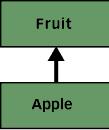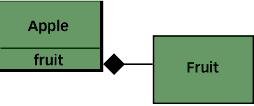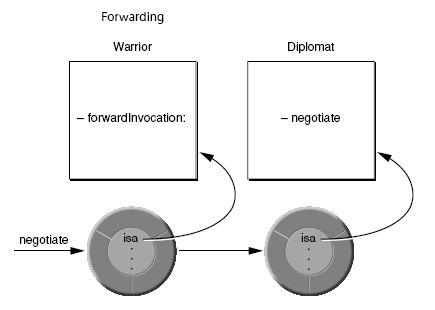CSC/ECE 517 Fall 2010/ch3 S30 RJ: Difference between revisions
No edit summary |
No edit summary |
||
| Line 113: | Line 113: | ||
can then be reused by a child or subclass object, delegation invokes services from other objects, thereby | can then be reused by a child or subclass object, delegation invokes services from other objects, thereby | ||
taking advantage of code that already exists to support the other existing object. The functionality available in the use of mixins in Ruby on Rails would be an example of delegation in OOP. | taking advantage of code that already exists to support the other existing object. The functionality available in the use of mixins in Ruby on Rails would be an example of delegation in OOP. | ||
One OO [http://www.example.com developer] offers the following thoughts about '''When NOT to use Inheritance but Delegation''': | |||
*''As we know that Inheritance is a good mechanism for re-using and extending the behavior of a class, but it should not seen as the only way to achieve this. It is not always right to use Inheritance to achieve re-usability and extensibility in architecture. Delegation provides an excellent alternative way for extending the behavior of a class or system. There are several situations when Delegation is more useful and flexible compared to Inheritance. For example:'' | |||
*''If an object can play one or more roles in system, then sub-classing becomes impractical, as the number of combinations may grow exponentially. In this case, Delegation would result in fewer classes.'' | |||
*''If you find that an object needs to be a different subclass of a given class at different points of time in your application, it is advisable to use Delegation instead of Inheritance. Inheritance is a static relationship. If a class inherits from another class, this relationship cannot be changed dynamically. On the other hand, Delegation is a dynamic relationship that can be changed at runtime.'' | |||
*''If you find that a class needs to hide a function or a attribute from a super-class, then it is not a right candidate for sub-classing. Delegation is an appropriate solution for this situation.'' | |||
*''You should not subclass a Utility class in to a problem domain specific class. By doing so, you would run the risk that your classes may have to be changed due to changes in Utility class that you have no control over. Though the risk may be small, there is no benefit of using Inheritance in this situation. Delegation is the appropriate solution for this.'' | |||
*''Well, we do have certain disadvantages of using Delegation over Inheritance. For example, designs based on Delegation have the following disadvantages over inheritance:'' | |||
*''Delegation results in smaller number of classes, but a larger number of objects in memory. This could result in performance issue when the objects in memory grow due to inefficient handling or disposal of objects.'' | |||
*''There is an extra level of object indirection due to Delegation. It makes the code more difficult to read, understand and debug.'' | |||
*''But still, Delegation would be the right choice for re-usability, extendibility and maintainability of the system.'' | |||
== '''References:''' == | == '''References:''' == | ||
References: <references/> | References: <references/> | ||
Revision as of 03:10, 6 October 2010
Decomposition, Message Forwarding, and Delegation versus Inheritance in OOP Design
Most OOP overviews explain what the concept of Inheritance is in Object Oriented Programming, and how Inheritance works, but not many OOP overviews discuss alternatives when Inheritance may not be the best design choice for an OO application. This topic briefly introduces the OOP concepts of Inheritance, Decomposition, Message Forwarding, and Delegation, and then discusses when Decomposition, Message Forwarding, and Delegation could be considered as potential alternatives to the use of Inheritance for some OOP applications.
It needs to be noted that different OOP authors interchange and blur the meaning of what is meant by Decomposition, Message Forwarding, and Delegation in OOP. In general, discussions about Decomposition, Message Forwarding, and Delegation in the context of OOP are suggesting alternative ways to accomplish OOP designs other than utilizing a traditional OOP design that uses pure Inheritance principles.
Inheritance in OOP Design
Inheritance is one of the key concepts in Object Oriented Programming. In OOP, parent classes describe and define attributes and capabilities of objects in a parent class. Subsequently subclasses can be defined to create objects that inherit or acquire the attributes and capabilities of objects that belong to the parent class, or Superclass of the child, or subclass. Programming code that is created by programmers to describe the attributes and methods of objects in a parent class can easily be reused by objects that are created in subclasses of the parent class. Using inheritance in a OO application is appropriate when the relationship between the Superclass and subclass is a 'Is-A' relationship. Consider the concept of single inheritance through class extension[1]
class Fruit {
//...
}
class Apple extends Fruit {
//...
}
In the code above, class Apple is related to class Fruit by inheritance, because Apple extends Fruit. In this example, Fruit is the superclass and Apple is the subclass.

Decomposition in OOP Design
A useful starting definition for Decomposition in OOP is "In OO decomp, we think in terms of identifying active, autonomous agents which are responsible for doing the work, and which communicate with each other to get the overall problem solved." [1]
The 'autonomous agents' mentioned above would correspond to designing several different objects that each have suitable functionality that together allow a task or process to be performed, rather than taking the time to design a grand Superclass and subclass inheritance hierarchy which contains one or a few overly complex objects that are required to address a given task or process. Mixins in Ruby on Rails would be an example of decomposition in OOP, since Mixins allow useful methods from classes to be easily mixed-in, or used as utility methods by classes that may not be suitably related in a traditional inheritance hierarchy.
Composition in OOP Design
In OOP literature, discussions that mention object oriented decomposition often also discuss the topic of object oriented composition. An alternative to a inheritance relationship is a composition relationship[2], whereby instance variables of an object refer to other objects.
class Fruit {
//...
}
class Apple {
private Fruit fruit = new Fruit();
//...
}
In the example above, class Apple is related to class Fruit by composition, because Apple has an instance variable that holds a reference to a Fruit object. The UML diagram for this composition relationship is shown below in Figure 2.

The author of the article used as the basis for my material composition relationship[3] states the following: "In this example, Apple is what I will call the front-end class and Fruit is what I will call the back-end class. In a composition relationship, the front-end class holds a reference in one of its instance variables to a back-end class"
With inheritance relationships, it is usually easy to add new subclasses, however changes made to the interface of the Superclass in an inheritance relationship are often said to be 'fragile', because such changes may cause problems for subclasses in the relationship, and at times cause 'rippled' problems for all subclasses of the superclass.
The author of the article poses the question "So how exactly do composition and inheritance compare?", and then the author provides his thoughs on several points of comparison:
- It is easier to change the interface of a back-end class (composition) than a superclass (inheritance). As the previous example illustrated, a change to the interface of a back-end class necessitates a change to the front-endclass implementation, but not necessarily the front-end interface. Code that depends only on the front-end interface still works, so long as the front-end interface remains the same. By contrast, a change to a superclass's interface can not only ripple down the inheritance hierarchy to subclasses, but can also ripple out to code that uses just the subclass's interface.
- It is easier to change the interface of a front-end class (composition) than a subclass (inheritance). Just as`superclasses can be fragile, subclasses can be rigid. You can't just change a subclass's interface without making`sure the subclass's new interface is compatible with that of its supertypes. For example, you can't add to a`subclass a method with the same signature but a different return type as a method inherited from a superclass. Composition, on the other hand, allows you to change the interface of a front-end class without affecting backend classes.
- Composition allows you to delay the creation of back-end objects until (and unless) they are needed, as well as changing the back-end objects dynamically throughout the lifetime of the front-end object. With inheritance, you get the image of the superclass in your subclass object image as soon as the subclass is created, and it remains part of the subclass object throughout the lifetime of the subclass.
- It is easier to add new subclasses (inheritance) than it is to add new front-end classes (composition), because inheritance comes with polymorphism. If you have a bit of code that relies only on a superclass interface, that code can work with a new subclass without change. This is not true of composition, unless you use composition with interfaces. Used together, composition and interfaces make a very powerful design tool.
- The explicit method-invocation forwarding (or delegation) approach of composition will often have a performance cost as compared to inheritance's single invocation of an inherited superclass method implementation.
- With both composition and inheritance, changing the implementation (not the interface) of any class is easy. The ripple effect of implementation changes remain inside the same class.
Message Forwarding in OOP Design
Message forwarding between objects, as implemented in dynamic typing OO languages such as Objective-C, provides an alternative to inheritance relationships between objects that are statically determined at compile time.
In an article entitled "Objective-C Dynamite!"[4], author Andrew Duncan describes message fowarding as follows:
- ....(the static compile time nature of Inheritance relationships.... is an unwelcome intrusion of implementation details into the conceptual design and practical use of a language. What's so bad about sending a message that is not understood? If a person on the street asks you for a flump, and you don't know how to respond, do you exit with a core dump? Do you feel that a Higher Power should prohibit the question from even being asked?
- Objective-C takes a simpler approach to method calls: it maintains runtime information about the class hierarchy, and searches it at call time for the appropriate code to handle each method call. The speed of modern processors, hardware tricks like branch prediction and speculative execution, and Objective-C runtime tricks like caching of search results, make this method-call implementation fast enough for all but the most nested of loops. In addition, this procedure can tell when the receiver has no matching method, and so can handle this situation in a defined way. Objective-C provides default behavior for unhandled messages but lets you customize it at will.
- Objective-C refers to this approach to calling methods as sending messages to objects, which describes well this outlook: inter-object communication is not like a function call, but more like mailing a letter, which gets delivered by a mechanism that is slower but more flexible than just branching to a new execution address. This makes possible all the techniques mentioned in the bullet points above. In addition, distributed programs are easier to design and implement, because message sending does not depend on one distributed component's knowing the inheritance hierarchy of another.
Figure 3 below is a depiction of message forwarding, as implemented by the language Objective-C.

In this illustration, an instance of the Warrior class forwards a negotiate message to an instance of the Diplomat class. The Warrior will appear to negotiate like a Diplomat. It will seem to respond to the negotiate message, and for all practical purposes it does respond (although it’s really a Diplomat that’s doing the work. [5]
The author of the main article "Objective-C Dynamite!" [4], referenced in this section on message forwarding offers the following reasons for considering message forwarding instead of statically determined inheritance:
- During development, a lot of design issues are in flux. It's a lot easier to work out how your framework is supposed to behave without having to start out in a most-factored state, with plenty of empty interface fluff. In fact, Objective-C lets you use static typing as well, so once you settle on a design,
you can declare your types with no penalty. Best of both worlds.
- Objective-C objects are more flexible because of this tolerance for unrecognized messages. In effect, they are already implementers (in an empty sense) of an infinite number of as-yet-undesigned interfaces. You can plug them into all sorts of designs, and if they have anything to offer, any service to provide, they will provide it; otherwise they will just get out of the way.
- Program safety is not decidable anyway. In any nontrivial program there are many bugs, among which type errors are a small subset; and an unhandled message may not even be a bug. And in any case, Objective-C provides a mechanism for intercepting and either discarding or redirecting unhandled messages. If it really
is a bug, wouldn't you prefer logging an error to calling some unexpected (and definitely wrong) method, as you would do in C++ if you called a method on an object that doesn't have it? (You would have to use casting to do this, to get around the compiler's static type-checking, of course.)
Delegation in OOP Design
Delegation in OOP is a technique or strategy whereby an object relies upon or receives services from another object in order to accomplish a task or process, rather than having an object have all required services or methods defined within itself. Delegation in OOP strives to allow one object to reuse functionality that another object can readily provide. Delegation in OOP can therefore be said to realize the benefits of code reuse, but not in an official OOP code reuse manner that is usually implied as a reason for implementing traditional OOP inheritance. Instead of creating new code in a parent or Superclass that can then be reused by a child or subclass object, delegation invokes services from other objects, thereby taking advantage of code that already exists to support the other existing object. The functionality available in the use of mixins in Ruby on Rails would be an example of delegation in OOP.
One OO developer offers the following thoughts about When NOT to use Inheritance but Delegation:
- As we know that Inheritance is a good mechanism for re-using and extending the behavior of a class, but it should not seen as the only way to achieve this. It is not always right to use Inheritance to achieve re-usability and extensibility in architecture. Delegation provides an excellent alternative way for extending the behavior of a class or system. There are several situations when Delegation is more useful and flexible compared to Inheritance. For example:
- If an object can play one or more roles in system, then sub-classing becomes impractical, as the number of combinations may grow exponentially. In this case, Delegation would result in fewer classes.
- If you find that an object needs to be a different subclass of a given class at different points of time in your application, it is advisable to use Delegation instead of Inheritance. Inheritance is a static relationship. If a class inherits from another class, this relationship cannot be changed dynamically. On the other hand, Delegation is a dynamic relationship that can be changed at runtime.
- If you find that a class needs to hide a function or a attribute from a super-class, then it is not a right candidate for sub-classing. Delegation is an appropriate solution for this situation.
- You should not subclass a Utility class in to a problem domain specific class. By doing so, you would run the risk that your classes may have to be changed due to changes in Utility class that you have no control over. Though the risk may be small, there is no benefit of using Inheritance in this situation. Delegation is the appropriate solution for this.
- Well, we do have certain disadvantages of using Delegation over Inheritance. For example, designs based on Delegation have the following disadvantages over inheritance:
- Delegation results in smaller number of classes, but a larger number of objects in memory. This could result in performance issue when the objects in memory grow due to inefficient handling or disposal of objects.
- There is an extra level of object indirection due to Delegation. It makes the code more difficult to read, understand and debug.
- But still, Delegation would be the right choice for re-usability, extendibility and maintainability of the system.
References:
References: <references/>